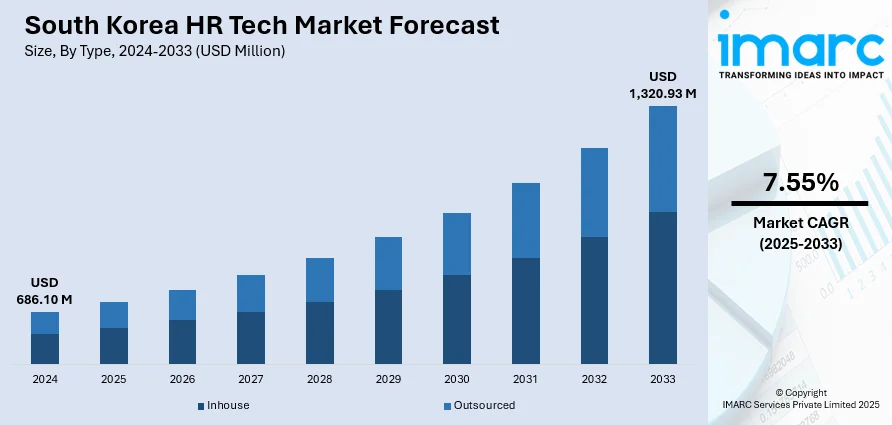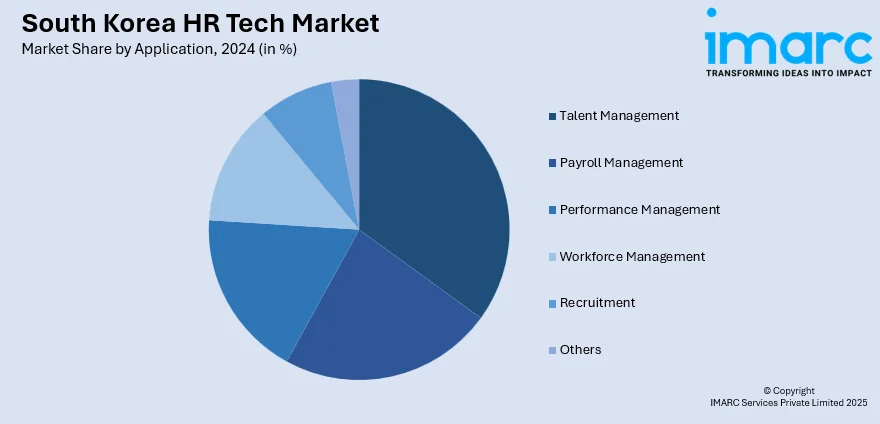
South Korea HR Tech Market Size, Share, Trends and Forecast by Application, Type, End Use Industry, Company Size, and Region, 2025-2033
South Korea HR Tech Market Overview:
The South Korea HR tech market size reached USD 686.10 Million in 2024. Looking forward, IMARC Group expects the market to reach USD 1,320.93 Million by 2033, exhibiting a growth rate (CAGR) of 7.55% during 2025-2033. At present, there is an increase in the need for automation of human resource management function. Moreover, companies are coming to appreciate the direct relationship between employee satisfaction and business organizational performance. Apart from this, the heightened focus of the government in promoting digital transformation is expanding the South Korea HR tech market share.
|
Report Attribute
|
Key Statistics
|
|---|---|
|
Base Year
|
2024
|
|
Forecast Years
|
2025-2033
|
|
Historical Years
|
2019-2024
|
| Market Size in 2024 | USD 686.10 Million |
| Market Forecast in 2033 | USD 1,320.93 Million |
| Market Growth Rate 2025-2033 | 7.55% |
South Korea HR Tech Market Trends:
Growing Need for Automation of Human Resource (HR) Functions
South Korea's HR tech industry is driven by the increasing need for automation of human resource management functions. Organizations are integrating more technology in order to automate recruitment, payroll, performance management, and other administrative functions. This move is greatly curbing the use of manual intervention, increasing efficiency, and diminishing errors. By automating mundane tasks, businesses are releasing precious time for HR professionals to spend on more strategic programs, including talent development and staff engagement. As cloud-based HR software and AI tools become increasingly popular, companies are progressively automating their HR processes and obtaining real-time data insights that are improving decision-making. In 2024, Shiftee, a prominent South Korean HR SaaS firm directed by CEO Shin Seung-won, is purchased by Skylake Equity Partners, one of the country’s major private equity companies. After Skylake's $280 million acquisition, Shiftee has restructured its corporation, distancing itself from its previous parent company, BusinessOn, to function autonomously.

To get more information on this market, Request Sample
Growing Emphasis on Employee Experience and Engagement
South Korea's HR Tech market is experiencing rapid growth because the market is also experiencing a greater emphasis on enhancing employee experience and engagement. Companies are coming to appreciate the direct relationship between employee satisfaction and business organizational performance. Consequently, they are incorporating sophisticated HR technologies to uplift employee engagement programs through tailored learning and development initiatives, reward systems, and real-time feedback loops. Virtual platforms allowing for constant communication between workers and managers are becoming a critical element in creating a positive company culture. HR Tech solutions are also assisting businesses to gauge employees' sentiment more accurately, hence enabling more targeted interventions that target workplace satisfaction. Through the utilization of employee-first tools and platforms, organizations are constantly improving retention rates and competing for top talent in a very competitive job market.
Government Support for Digital Transformation
The government of South Korea is actively promoting digital transformation, which is driving the adoption of HR Tech solutions in various industries. Through efforts aimed at supporting smart technologies and digital infrastructure, companies are being prompted to digitize their HR processes. Government initiatives designed to promote innovation and finance technology integration are facilitating companies to implement leading-edge HR solutions. The government of South Korea is also investing in skill development initiatives so that the workforce is capable of leveraging the new HR technologies successfully. For instance, in 2025, migrant laborers in South Korea will have access to complimentary vocational training from government-approved institutions across the country. The initiative is included in governmental efforts to enhance the job competencies of foreign workers primarily hired by small-scale labor-intensive manufacturing companies. The Human Resources Development Service of Korea (HRDSK) announced that it will accept applications from E-9 visa migrant workers and will choose 5,000 for a government-funded job training initiative running from June to November this year. In response to the government's efforts, companies across industries are using technologies such as artificial intelligence (AI), big data analytics, and machine learning, increasingly to improve HR functions. The ongoing government encouragement is helping drive rapid change in HR practices, thereby contributing to the South Korea HR tech market growth.
South Korea HR Tech Market Segmentation:
IMARC Group provides an analysis of the key trends in each segment of the market, along with forecasts at the country and regional levels for 2025-2033. Our report has categorized the market based on application, type, end-use industry, and company size.
Application Insights:

- Talent Management
- Payroll Management
- Performance Management
- Workforce Management
- Recruitment
- Others
The report has provided a detailed breakup and analysis of the market based on the application. This includes talent management, payroll management, performance management, workforce management, recruitment, and others.
Type Insights:
- Inhouse
- Outsourced
A detailed breakup and analysis of the market based on the type have also been provided in the report. This includes inhouse and outsourced.
End Use Industry Insights:
- TTH (Travel, Transportation, Hospitality)
- Public Sector
- Health Care
- Information Technology
- BFSI (Banking, Financial Services, and Insurance)
- Others
The report has provided a detailed breakup and analysis of the market based on the end use industry. This includes TTH (travel, transportation, hospitality), public sector, health care, information technology, BFSI (banking, financial services, and insurance), and others.
Company Size Insights:
- Less than 1k Employees
- 1k -5k Employees
- Greater than 5k Employees
The report has provided a detailed breakup and analysis of the market based on the company size. This includes less than 1k employees, 1k -5k employees, and greater than 5k employees.
Regional Insights:
- Seoul Capital Area
- Yeongnam (Southeastern Region)
- Honam (Southwestern Region)
- Hoseo (Central Region)
- Others
The report has also provided a comprehensive analysis of all the major regional markets, which include Seoul Capital Area, Yeongnam (Southeastern Region), Honam (Southwestern Region), Hoseo (Central Region), and others.
Competitive Landscape:
The market research report has also provided a comprehensive analysis of the competitive landscape. Competitive analysis such as market structure, key player positioning, top winning strategies, competitive dashboard, and company evaluation quadrant has been covered in the report. Also, detailed profiles of all major companies have been provided.
South Korea HR Tech Market Report Coverage:
| Report Features | Details |
|---|---|
| Base Year of the Analysis | 2024 |
| Historical Period | 2019-2024 |
| Forecast Period | 2025-2033 |
| Units | Million USD |
| Scope of the Report |
Exploration of Historical Trends and Market Outlook, Industry Catalysts and Challenges, Segment-Wise Historical and Future Market Assessment:
|
| Applications Covered | Talent Management, Payroll Management, Performance Management, Workforce Management, Recruitment, Others |
| Types Covered | Inhouse, Outsourced |
| End Use Industries Covered | TTH (Travel, Transportation, Hospitality), Public Sector, Health Care, Information Technology, BFSI (Banking, Financial services, and Insurance), Others |
| Company Sizes Covered | Less than 1k Employees, 1k -5k Employees, Greater than 5k Employees |
| Regions Covered | Seoul Capital Area, Yeongnam (Southeastern Region), Honam (Southwestern Region), Hoseo (Central Region), Others |
| Customization Scope | 10% Free Customization |
| Post-Sale Analyst Support | 10-12 Weeks |
| Delivery Format | PDF and Excel through Email (We can also provide the editable version of the report in PPT/Word format on special request) |
Key Questions Answered in This Report:
- How has the South Korea HR tech market performed so far and how will it perform in the coming years?
- What is the breakup of the South Korea HR tech market on the basis of application?
- What is the breakup of the South Korea HR tech market on the basis of type?
- What is the breakup of the South Korea HR tech market on the basis of end use industry?
- What is the breakup of the South Korea HR tech market on the basis of company size?
- What is the breakup of the South Korea HR tech market on the basis of region?
- What are the various stages in the value chain of the South Korea HR tech market?
- What are the key driving factors and challenges in the South Korea HR tech market?
- What is the structure of the South Korea HR tech market and who are the key players?
- What is the degree of competition in the South Korea HR tech market?
Key Benefits for Stakeholders:
- IMARC’s industry report offers a comprehensive quantitative analysis of various market segments, historical and current market trends, market forecasts, and dynamics of the South Korea HR tech market from 2019-2033.
- The research report provides the latest information on the market drivers, challenges, and opportunities in the South Korea HR tech market.
- Porter's five forces analysis assist stakeholders in assessing the impact of new entrants, competitive rivalry, supplier power, buyer power, and the threat of substitution. It helps stakeholders to analyze the level of competition within the South Korea HR tech industry and its attractiveness.
- Competitive landscape allows stakeholders to understand their competitive environment and provides an insight into the current positions of key players in the market.
Need more help?
- Speak to our experienced analysts for insights on the current market scenarios.
- Include additional segments and countries to customize the report as per your requirement.
- Gain an unparalleled competitive advantage in your domain by understanding how to utilize the report and positively impacting your operations and revenue.
- For further assistance, please connect with our analysts.
 Request Customization
Request Customization
 Speak to an Analyst
Speak to an Analyst
 Request Brochure
Request Brochure
 Inquire Before Buying
Inquire Before Buying




.webp)




.webp)












